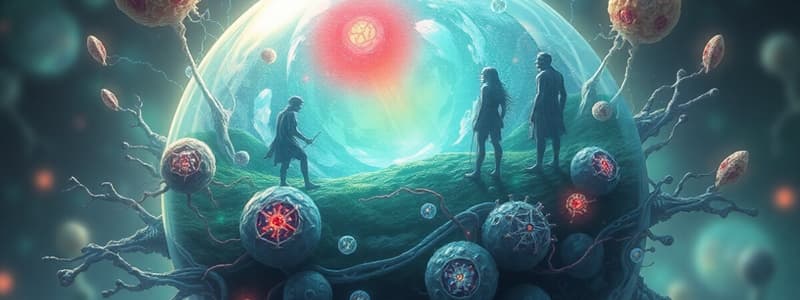Podcast
Questions and Answers
Qu'est-ce que la biologie?
Qu'est-ce que la biologie?
La biologie est l'étude de la vie et des organismes vivants.
Quels sont les deux types de cellules?
Quels sont les deux types de cellules?
- Cellules animales
- Cellules végétales
- Prokaryotes (correct)
- Eukaryotes (correct)
La théorie cellulaire stipule que tous les organismes vivants sont composés de cellules.
La théorie cellulaire stipule que tous les organismes vivants sont composés de cellules.
True (A)
Qu'est-ce que l'homéostasie?
Qu'est-ce que l'homéostasie?
Qu'est-ce que le métabolisme?
Qu'est-ce que le métabolisme?
Qu'est-ce que l'évolution?
Qu'est-ce que l'évolution?
Qu'est-ce que la génétique?
Qu'est-ce que la génétique?
Qu'est-ce que l'écologie?
Qu'est-ce que l'écologie?
Quel est le rôle de la classification des organismes?
Quel est le rôle de la classification des organismes?
Quel est le nom de la branche de la biologie qui étudie les molécules biologiques?
Quel est le nom de la branche de la biologie qui étudie les molécules biologiques?
Quel est le champ d'étude de la biologie cellulaire?
Quel est le champ d'étude de la biologie cellulaire?
Que signifie 'développement' dans le contexte de la biologie du développement?
Que signifie 'développement' dans le contexte de la biologie du développement?
Qu'est-ce que la physiologie?
Qu'est-ce que la physiologie?
Qu'est-ce que la botanique?
Qu'est-ce que la botanique?
Donnez une brève définition de la microbiologie.
Donnez une brève définition de la microbiologie.
Qu'est-ce que la biochimie?
Qu'est-ce que la biochimie?
Expliquez brièvement le processus de la photosynthèse.
Expliquez brièvement le processus de la photosynthèse.
Quel est le résultat de la respiration cellulaire?
Quel est le résultat de la respiration cellulaire?
Décrivez la reproduction.
Décrivez la reproduction.
Qu'est-ce que la croissance et le développement?
Qu'est-ce que la croissance et le développement?
Quel est le rôle de la réponse aux stimuli dans la vie des organismes?
Quel est le rôle de la réponse aux stimuli dans la vie des organismes?
Parmi les suivantes, quelle est une application importante de la biologie dans le domaine de la santé?
Parmi les suivantes, quelle est une application importante de la biologie dans le domaine de la santé?
Comment la biologie contribue-t-elle aux problèmes d'agriculture?
Comment la biologie contribue-t-elle aux problèmes d'agriculture?
Expliquez comment la biologie contribue à la conservation.
Expliquez comment la biologie contribue à la conservation.
Quel est le lien entre la biologie et le développement technologique?
Quel est le lien entre la biologie et le développement technologique?
Comment la biologie contribue-t-elle à notre compréhension de l'évolution de la vie?
Comment la biologie contribue-t-elle à notre compréhension de l'évolution de la vie?
Flashcards
La biologie
La biologie
L'étude de la vie et des organismes vivants.
Théorie cellulaire
Théorie cellulaire
Tous les êtres vivants sont composés de cellules, unités de base de la vie. Les cellules peuvent être procaryotes (sans noyau) ou eucaryotes (avec noyau).
Homéostasie
Homéostasie
Maintien de conditions internes stables malgré les changements environnementaux.
Métabolisme
Métabolisme
Signup and view all the flashcards
Évolution
Évolution
Signup and view all the flashcards
Génétique
Génétique
Signup and view all the flashcards
Écologie
Écologie
Signup and view all the flashcards
Classification des organismes
Classification des organismes
Signup and view all the flashcards
Biologie moléculaire
Biologie moléculaire
Signup and view all the flashcards
Photosynthèse
Photosynthèse
Signup and view all the flashcards
Respiration cellulaire
Respiration cellulaire
Signup and view all the flashcards
Reproduction
Reproduction
Signup and view all the flashcards
Croissance et développement
Croissance et développement
Signup and view all the flashcards
Réponse aux stimuli
Réponse aux stimuli
Signup and view all the flashcards
Study Notes
Introduction to Biology
- Biology is the study of life and living organisms.
- It encompasses a vast range of topics, from the smallest molecules within cells to the largest ecosystems on Earth.
- Biology explores the structure, function, growth, evolution, distribution, and taxonomy of living organisms.
Key Concepts in Biology
- Cell Theory: All living organisms are composed of cells, which are the basic units of life. Cells can be prokaryotic (lacking a nucleus) or eukaryotic (possessing a nucleus).
- Homeostasis: Organisms maintain stable internal conditions even if the external environment changes.
- Metabolism: The sum of all chemical reactions that occur within an organism, including the breakdown and synthesis of molecules for energy production and growth.
- Evolution: The process of change in the heritable characteristics of biological populations over successive generations. This is driven by natural selection.
- Genetics: The study of genes, heredity, and variation in living organisms.
- Ecology: The study of the interactions between organisms and their environment. This includes how organisms interact with each other and the non-living components of their surroundings.
- Classification of Organisms: Organisms are grouped into a hierarchical system of classification based on shared characteristics. This includes kingdoms (or domains in modern systems) like Bacteria, Archaea, and Eukarya. Common characteristics aid in grouping.
Branches of Biology
- Molecular Biology: Focuses on the structure and function of biological molecules like DNA, RNA, and proteins.
- Cell Biology: Studies the structure and function of cells.
- Genetics: Examines heredity and the variation of traits among organisms.
- Developmental Biology: Investigates the process by which organisms develop from fertilized eggs to mature individuals.
- Evolutionary Biology: Studies the process of evolution and its impact on organisms and their adaptation.
- Ecology: Explores how organisms interact with each other and their environment. This includes population dynamics, community structures, and ecosystem processes.
- Physiology: Examines the functions of organisms at different levels, from cells to whole organisms.
- Zoology: The study of animals.
- Botany: The study of plants.
- Microbiology: The study of microorganisms.
- Biochemistry: The study of chemical processes within and relating to living organisms.
Basic Biological Processes
- Photosynthesis: The process by which plants and other organisms convert light energy into chemical energy in the form of sugars.
- Cellular Respiration: The process by which cells break down glucose to release energy for cellular activities.
- Reproduction: The process by which organisms create new individuals of their kind. This includes sexual and asexual reproduction.
- Growth and Development: The increase in size and complexity of an organism throughout its life.
- Response to Stimuli: The ability of organisms to react to changes in their environment, either external or internal, through adaptations and responses of various kinds.
Importance of Biology
- Understanding fundamental biological processes and mechanisms is crucial for health care.
- Biology plays a crucial role in solving problems in agriculture and conservation.
- Biology aids in the development of new technologies and advancements in various fields.
- It provides a scientific basis for understanding the evolution of life.
- It plays a vital role in our understanding of the universe and our place within it, connecting living things to non living entities that drive many processes and factors influencing life.
Studying That Suits You
Use AI to generate personalized quizzes and flashcards to suit your learning preferences.




